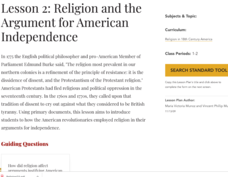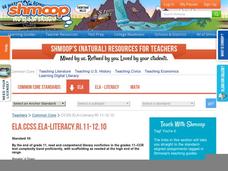PBS
Thomas Paine: Writer and Revolutionary
Is the pen really mightier than the sword? Scholars analyze the impact Thomas Paine's book Common Sense had on the American Revolution. Video clips and primary sources investigate the role Paine had on dissent in the colonies....
National Endowment for the Humanities
Common Sense: The Rhetoric of Popular Democracy
Students identify important arguments for independence made in Thomas Paine's Common Sense. They explain why these arguments helped persuade American colonists that independence was necessary. Students describe the importance of Common...
Curated OER
Claims in "The Crisis, No. 1"
"The Crisis, No. 1" is the focus of a series of exercises that ask learners to read closely and annotate Thomas Paine's text. Groups identify claims and evidence in the essay and present their arguments to the class. Teacher background...
Alabama Learning Exchange
American Revolution
Introduce learners to the key players of the American Revolution. Each slide provides biographical information on the following people: John Adams, Samuel Adams, Crispus Attucks, King George III, Lord Cornwallis, Thomas Paine, Polly...
Curated OER
Lesson 2: Using Common Sense
Tenth graders explore the impact of Thomas Paine on the American Revolution. In this colonial America lesson, 10th graders analyze Common Sense and then paraphrase selected excerpts of the pamphlet. Students also respond to discussion...
Curated OER
The American Crisis, Number 1
Use this presentation about Thomas Paine's The American Crisis series to guide any number of assignments. The slides provide instructions for a literary terms assignment, an open response journal entry, two research writing...
K20 LEARN
Give Me Liberty or Give Me Death: The Journey to Revolution
The words of "Common Sense" and Patrick Henry's "Give me liberty or give me death!" speech ring throughout history. Scholars explore the nuances of each patriot's argument using excerpts from the famous pamphlet and speech and a recorded...
Curated OER
The Enlightenment: Matching #1
Matching exercises can help learners build a functional vocabulary related to many different concepts. They match ten ideas and key players commonly associated with the Enlightenment to their definitions. Ben Franklin, Edward Gibbon, and...
Curated OER
Deism: Paine and Jefferson Student Worksheet
For this Deism worksheet, students read an article about the opinions of Thomas Paine and Thomas Jefferson. Students then respond to 12 short answer questions.
Curated OER
The Beginnings of Constitutional Government
Students examine excerpts of Thomas Paine's Common Sense. For this early American history lesson, students read Paine's pamphlet and analyze the information according the rubric provided.
Carolina K-12
Causes of the American Revolution
Beginning with the experience of hearing that lockers in school will be taxed, through analysis of political cartoons and informational text, and culminating in a debate between loyalists and patriots, your class members will engage in a...
Carolina K-12
Revolutionary War Era Tick-Tack- Toe
So many fantastic activities on the American Revolution! From drawing political cartoons illustrating events of the Boston Massacre to writing a diary entry as a shopkeeper during the Boston Tea Party, your young historians will...
Curated OER
The Road to Democracy
Eleventh graders examine the road to the American Revolution. For this American Revolution lesson, 11th graders read Thomas Paine's works and identify the issues that the colonists had with the British government.
Curated OER
The Human Jigsaw
Fourth graders, using Thomas Paine's "The Crisis, No. 1" from The American Crisis, form a human jigsaw.
Curated OER
Common Sense Lesson Plan
Learners examine excerpts of "Common Sense" and determine how it influenced the times. Using other primary source documents, they identify the amount of political discourse before and during the American Revolution. They answer questions...
Curated OER
The Revolutionary War
March your young scholars off to war with this presentation, which provides details to the American Revolution such as important figures (Jefferson, Franklin, Henry), facts about the Declaration of Independence, and definitions of key...
Curated OER
The War for Independence: 4th Grade
Colonial Independence is a hot topic in the 4th and 5th grade; this PowerPoint highlights the victories, the decision for Independence, and the forces for and against colonial independence from England. This PowerPoint presents scant...
Curated OER
The Road to Revolution: (1770-1776)
Posing a guiding question about the inevitability of the American Revolution, the presentation guides students through the circumstances leading up to "The shot heard 'round the world" up to the Declaration of Independence. Teachers can...
Curated OER
Moving Toward Independence
Eighth graders identify the reasons why colonists were fed up enough to want to break free of colonial rule and create their own government. They complete an in-dept analysis of the pamphlet Common Sense and it's role in fueling the...
National Endowment for the Humanities
Lesson 2: Religion and the Argument for American Independence
Young scholars examine how religion affected arguments justifying American independence. They read and analyze primary source documents, and write an essay analyzing how Americans used religious arguments to justify revolution against a...
Carolina K-12
Colonialism and American Foundations Sample Test Questions
What was the main cause of European colonization in America? How did Thomas Paine's Common Sense play a role in the establishment of the United States? What was the trans-Atlantic slave trade? These are just a few of the many questions...
Shmoop
ELA.CCSS.ELA-Literacy.RI.11-12.10
Assess whether your class members can comprehend complex informational text with a series of drills based on selections from Emerson, Thoreau, and G.K. Chesterton. The exercises could also be used for group work or a full-class discussion.
Curated OER
The Declaration and Beyond
Students are explained that they are going to use a part of Thomas Paine's 1776 pamplet Common Sense as a starting point for exploring about argumentation, or persuasive writing. They are given a copy of the excerpt. Students discuss...
New York City Department of Education
Colonial America and The American Revolution
How did the founding of the American colonies lead to a revolution? Use the essential question and sample activities to guide learners through a series of history lessons. Additionally, the packet includes effective strategies to...
Other popular searches
- Common Sense Thomas Paine
- Paine, Thomas Common Sense
- Common Sense, Thomas Paine
- Common Sense by Thomas Paine

























